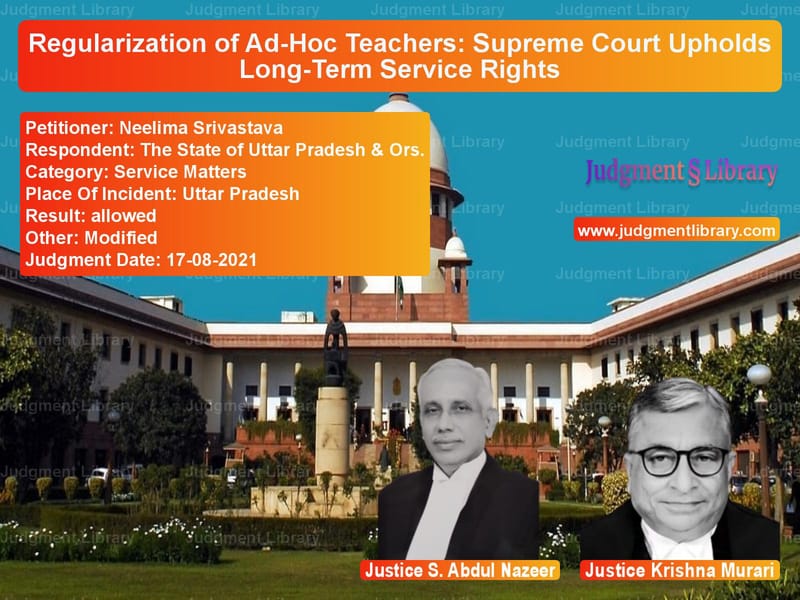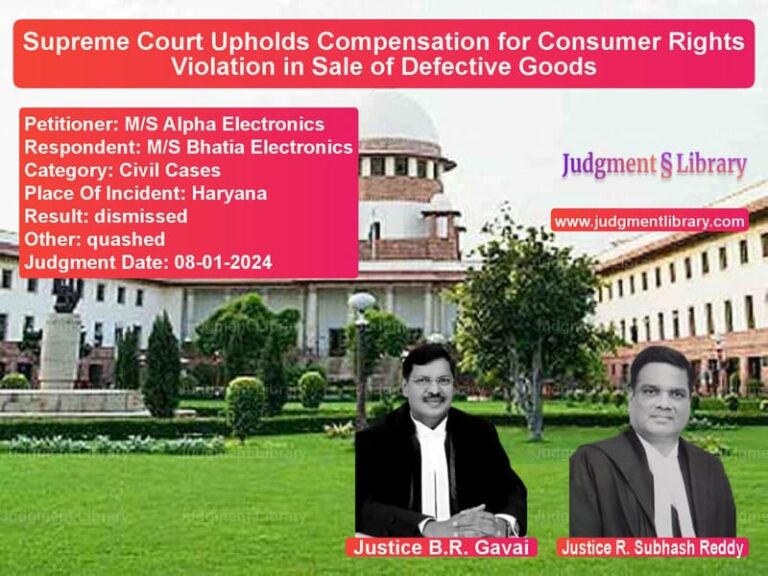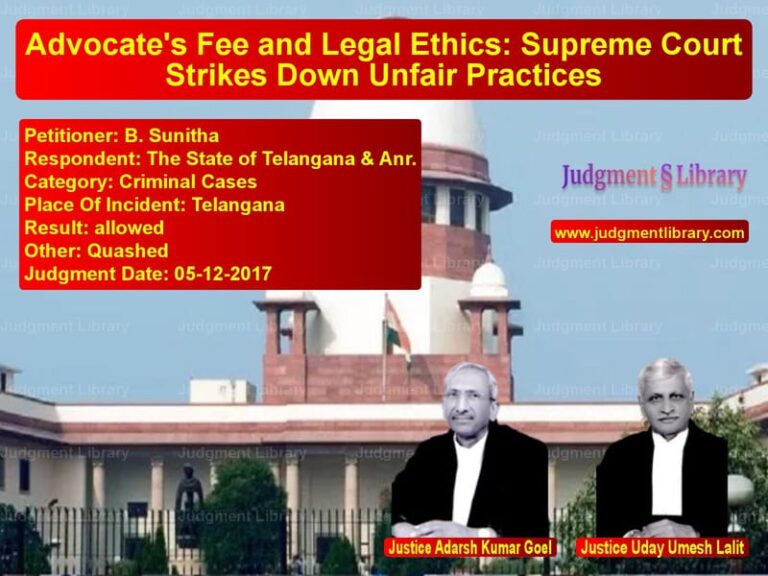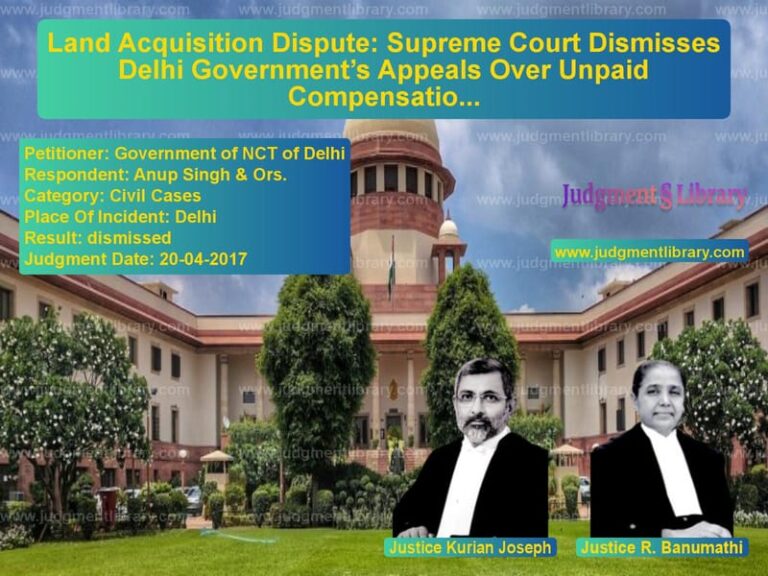Regularization of Ad-Hoc Teachers: Supreme Court Upholds Long-Term Service Rights
The case of Neelima Srivastava vs. The State of Uttar Pradesh & Ors. dealt with the regularization of ad-hoc teachers in government schools and whether long-term service, despite an initially temporary appointment, could confer a right to permanency. The Supreme Court’s ruling reinforced that ad-hoc appointees who serve for extended periods should not be arbitrarily denied regularization if they meet eligibility criteria.
Case Background
Neelima Srivastava, the appellant, was appointed as an Assistant Music Teacher at Government Inter College, Mahmoodabad, District Sitapur, on 23rd July 1984. Her appointment was originally against a leave vacancy. The appointment order specified that her service would continue until the regular incumbent rejoined or till 20th May 1986, whichever was earlier.
However, the regular incumbent, Smt. Safia Khatoon, never returned, and the appellant continued in service uninterruptedly. When the Uttar Pradesh government enacted the UP Secondary Education Department Regularization of Ad Hoc Appointments on the Post of Trained Graduate Teachers Rules, 2001, she applied for regularization. Her claim was rejected, leading to prolonged litigation.
Arguments by the Petitioner (Neelima Srivastava)
- The appellant argued that she had continuously served for more than 21 years and had gained a legal right to hold the post.
- “Despite her initial appointment as an ad-hoc teacher, her uninterrupted service and fulfillment of all eligibility criteria under the 2001 Regularization Rules entitled her to regularization,” the appellant contended.
- The Uttar Pradesh High Court had previously ruled in her favor, declaring that her service was no longer a stopgap arrangement.
- The refusal to regularize her appointment violated the principles of fairness and natural justice.
Arguments by the Respondents (State of Uttar Pradesh)
- The State argued that her appointment was ad-hoc and against a leave vacancy, which was not covered under the Regularization Rules of 2001.
- “Her appointment was a temporary measure, and regularization could not be granted where the initial appointment was not through a competitive process,” the respondents asserted.
- The government relied on the Supreme Court’s ruling in Secretary, State of Karnataka vs. Umadevi & Ors., arguing that irregular appointees had no automatic right to permanent employment.
- The decision to deny regularization was in line with state policy and the prevailing legal framework.
Supreme Court’s Observations
The Supreme Court critically examined whether the refusal to regularize the appellant’s service was justified. It considered multiple precedents, including Umadevi (3) and Rudra Kumar Sain vs. Union of India, to determine whether long-term service created a legitimate expectation of regularization.
1. Nature of Appointment and Continuity in Service
- The Court held that the appellant was appointed by a competent authority on a sanctioned post and possessed all required qualifications.
- “The petitioner has more than 21 years of experience in the role. By virtue of continuous satisfactory service, she has acquired a right to hold the post,” the judgment stated.
2. Applicability of Regularization Rules, 2001
- The Court held that the appellant’s case fell within the purview of the 2001 Regularization Rules.
- “The refusal to apply the 2001 Rules despite the appellant fulfilling all eligibility conditions is an arbitrary exercise of power,” the Court noted.
3. Interpretation of the Umadevi (3) Judgment
- The respondents relied on Umadevi (3) to argue against regularization. However, the Court clarified that Umadevi (3) carved out exceptions for employees who had served for over 10 years on sanctioned posts.
- “The Constitution Bench in Umadevi (3) permitted regularization in cases where appointees had worked for more than ten years and fulfilled all necessary qualifications,” the Court reiterated.
4. Legitimacy of Government’s Refusal
- The Court held that the State’s refusal to regularize the appellant was not legally tenable.
- “The rejection of the appellant’s claim, despite a High Court ruling in her favor, is unjust and violates the doctrine of legitimate expectation,” the Court observed.
Supreme Court’s Judgment
The Supreme Court ruled in favor of the appellant, stating:
- “The impugned judgment of the Division Bench is set aside, and the appellant is declared entitled to regularization.”
- “The appellant shall be granted all consequential benefits within three months of this judgment.”
- “The doctrine of finality applies, as the previous High Court ruling had already determined her right to regularization.”
Conclusion
This judgment reinforces the principle that prolonged ad-hoc service on sanctioned posts should not be arbitrarily disregarded. The Supreme Court upheld the rights of employees who have served for extended periods, ensuring that state policies and rules are implemented fairly. This ruling is a significant precedent in service matters concerning ad-hoc employees.
Petitioner Name: Neelima Srivastava.Respondent Name: The State of Uttar Pradesh & Ors..Judgment By: Justice S. Abdul Nazeer, Justice Krishna Murari.Place Of Incident: Uttar Pradesh.Judgment Date: 17-08-2021.
Don’t miss out on the full details! Download the complete judgment in PDF format below and gain valuable insights instantly!
Download Judgment: neelima-srivastava-vs-the-state-of-uttar-p-supreme-court-of-india-judgment-dated-17-08-2021.pdf
Directly Download Judgment: Directly download this Judgment
See all petitions in Employment Disputes
See all petitions in Recruitment Policies
See all petitions in Public Sector Employees
See all petitions in Judgment by S. Abdul Nazeer
See all petitions in Judgment by Krishna Murari
See all petitions in allowed
See all petitions in Modified
See all petitions in supreme court of India judgments August 2021
See all petitions in 2021 judgments
See all posts in Service Matters Category
See all allowed petitions in Service Matters Category
See all Dismissed petitions in Service Matters Category
See all partially allowed petitions in Service Matters Category







